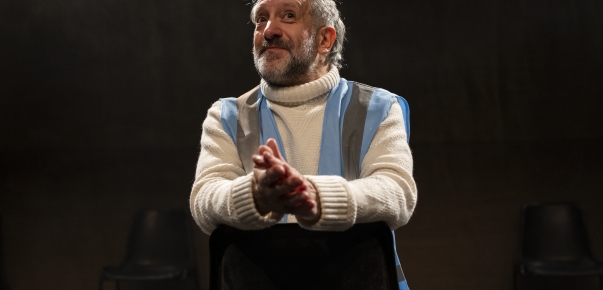Minotaur: a note from writer Adam Peck
28 Mar 2014It’s less than a week until Minotaur returns from its voyage around schools in Bridgewater back to our Studio for a week of performances in our Theatre. Before we encounter the Minotaur first hand we thought we’d better gather a few tips and insights into what we can expect from this ferocious beast. We spoke to writer Adam Peck to hear how he has created this latest adaptation of the ancient myth.
[gallery type="slideshow" ids="176470710,176470711,176470712,176470713,176470714,176470715,176470716,176470717,176470718"]
What do you love most about writing for theatre?
Its immediacy. When I'm writing I imagine how my words will be spoken, what the actor will look like whilst they’re saying them, how the stage space will be configured and lit etc. I see the play in my head as I write and I find that very rewarding. Just as we play as children - making imaginary worlds - I write plays and do the same kind of thing.
What has been the most memorable moment of your career?
There are a few, and I remember them for different reasons: stepping onto the Quarry stage at the West Yorkshire Playhouse aged 15 (my first proper acting job); having my play, Bonnie & Clyde, published by Oberon Books; Cinderella: A Fairytale being nominated for an Olivier Award. I think I'm always seeking recognition!
How did you first approach Minotaur? What made you want to adapt the famous legend?
In my head it seemed to fit with the whole idea of taking a play into schools in Somerset. Lots of the children who would see the show there were highly likely to have never seen a piece of professional theatre before, and are also statistically likely to never live anywhere other than their hometowns during their lifetimes. I decided to use a story that I felt could exemplify the excitement of theatre, and also explore the themes of leaving home and finding your independence.
Minotaur is quite interactive with its audiences, is this something you thought about while you were writing the script?
Definitely. As I said I wanted this piece of theatre to be exciting, and keeping the audience guessing what might happen next was part of that. There is no defined acting area, and the audience are always in and amongst the action of the play. Sometimes the audience are cast as Athenian children, other times they are sitting in the heart of the labyrinth. Things often happen in plays at a distance; this time I wanted the audience to feel included, if not immersed.
You’ve written for younger audiences and worked with youth theatre before, how do your experiences on Minotaur compare?
Most of my work is devised and made in collaboration with other artists: my role is usually to contribute ideas, to write down what is improvised and then to edit and refine the script. Minotaur is the first play I've written from scratch in two years. I love collaborating and making work in the way I've described above but in writing Minotaur I had complete control over the direction the story took and that felt very freeing. I spoke often to the director, Toby Hulse, and he was a great help in formulating the play. We also had readings and workshops where actors would share their thoughts and responses to acting out the play, and that informed how and what I wrote. Ultimately though, the play is my vision of the world of the Minotaur.
What has been the most enjoyable part about working on this project?
Working out why and how the story of Theseus and the Minotaur speaks to us today. I felt sure when I settled on this story that it was right for this project and seeing the young audiences responses I think I was right. That feels very rewarding. The fact that audiences enjoy the play is the most enjoyable thing for me.
What’s next in the pipeline? What are you working on at the moment?
I'm currently writing a script to accompany Coppelia for English National Ballet, helping two playwrights complete their own scripts, preparing myself to write the sequel to Minotaur, and this Summer will start work on 101 Dalmatians - this year’s Christmas show for Travelling Light and Tobacco Factory Theatres.
Minotaur is showing in our Studio from 1-9 April. Tickets and information can be found here.


